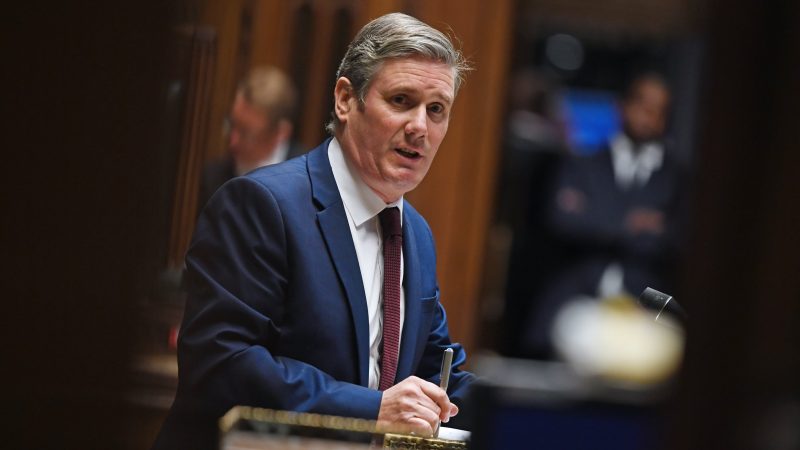
Labour MPs are being instructed by the leadership to abstain on the House of Commons vote tonight that will see parliamentarians express their views on the new coronavirus restrictions being brought in by the Prime Minister. Following the lockdown in England, the government is planning a return to the three-tier system. It is expected that these fresh regulations will pass tonight, albeit with a sizeable Tory rebellion, and kick in tomorrow.
But a number of Labour MPs are unhappy with the whip to abstain. They agree with Labour’s general objections to the Tory approach to Covid-19: no increase in statutory sick pay, insufficient support for businesses affected, workers excluded entirely from aid. Some believe the leadership could have pushed harder for concessions from the government on these key battlegrounds. These are typically not the issues that are persuading MPs to defy the whip, however.
In many cases, the concerns pushing Labour MPs to consider voting against the rules tonight relate to the allocation of tiers. This brings them in line with the protests of Conservative MPs. Labour frontbencher Tan Dhesi, who represents Slough, simply asked Boris Johnson this afternoon: “Why does the Prime Minister hate Slough?”.
Slough has been singled out, separated from the rest of Berkshire, to be put in Tier 3 – a “dot of red in a sea of orange”. Dhesi has pointed out that there are areas in neighbouring London and Essex with higher Covid transmission rates. The PM replied: “I love Slough, but I understand what he’s saying.” Johnson has promised to “look at how we can reflect as closely as possible the reality on the ground” in future reviews of the tiers.
While Dhesi’s constituency is in the South East, many of the Labour MPs most outspoken against the new rules represent seats in the North. Shadow cabinet member Cat Smith has highlighted reports that the economy of London was taken into consideration when placing the capital in Tier 2, yet the economy in the North of England was not. Her area, she says, has infection rates far lower than many London boroughs and places like Cumbria. This is a question of ‘levelling up’ and regional inequality.
These opposition frontbenchers are thought to have been crucial in the decision to whip Labour MPs to abstain rather than vote in favour. (The leadership had already ruled out voting against, as Labour supports restrictions in principle and does not want the lockdown to give way to no rules.) A number of backbenchers, on the other hand, will find it difficult to defy the whip but not impossible. Grahame Morris, for example, will vote against the rules but has said that the government could have won his backing “with a competent and comprehensive support package”.
Andrew Gwynne also plans to vote against the new tiers tonight. The MP for Denton and Reddish represents a Greater Manchester seat that has been living under tougher restrictions since July, which means his constituents have not been able to mix indoors for over four months. Like mayor Andy Burnham, he is concerned about the disproportionate impact on the hospitality sector. Gwynne says he “will never understand the logic” of a system that allows busy shopping centres but not families to “sit responsibly at a table for a meal and a drink in a bar or restaurant”.
Richard Burgon, a key figure on the Labour left, has announced that he will be voting against the government proposals on the basis that the approach “risks a deadly third wave” and he wants the lockdown extended. The Leeds MP said: “It would be better to use the next few weeks until Christmas to extend the lockdown, with proper levels of financial support and sick pay… This would not only save lives but make it more likely that we could avoid further lockdowns in the new year”. Bell Ribeiro-Addy similarly regards the new tier system to be “inadequate”, meaning not tough enough.
Emma Lewell-Buck has also revealed her intention to vote against the measures today, but for very different reasons. The South Shields MP has urged the government to adopt an approach that will allow us to “live with the virus in the safest way possible” and “not trash the economy”. This sounds more like John Spellar’s argument, in favour of risk management over risk avoidance, which is the opposite of the suggestions being put forward by Labour left MPs such as Burgon and Jon Trickett, who has written in LabourList that there should be “uniform restrictions”. Derek Twigg will also vote against the restrictions based on the need to strike a “balance”.
Around 20 Labour MPs are expected to oppose the government measures tonight – the list of names may look a little like the 23 rebels who voted against the 10pm hospitality curfew in October – but they are not doing so on the same grounds. Some want more economic support, while agreeing with the approach when it comes to the science, much like the leadership. Many of these critics are focused on regional inequality. Others, however, fundamentally oppose the government’s approach – whether from a lockdown-sceptic perspective or the opposite, in favour of a ‘zero Covid’ strategy. While the Prime Minister is “fatally split between appeasing his backbenchers and following the science”, as Keir Starmer put it today, the Labour leader faces a more complicated picture, with a number of Labour rebels who will not be breaking ranks for the same reasons.




More from LabourList
‘Labour’s quiet quest for democratic renewal’
‘Labour promised to make work pay. Now it must deliver for young people’
‘Council Tax shouldn’t punish those who have the least or those we owe the most’